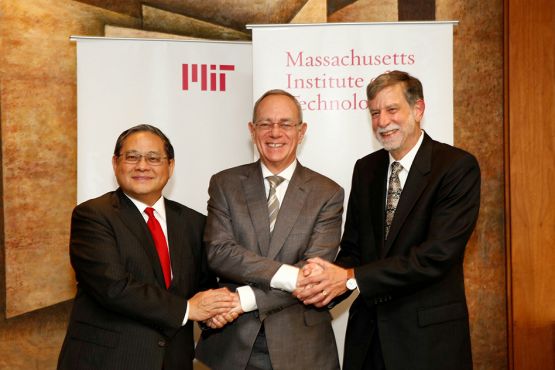Innovation Node Hong Kong: Alumni Bring Ideas to Impact
-
-
slice.mit.edu
Filed Under
Recommended

In November, President Rafael Reif announced a new program in Hong Kong titled Innovation Node. This program is part of the MIT Innovation Initiative, which helps MIT students combine scientific insights with hands-on opportunities and collaborate with local students, businesses, and alumni. This node is the first from the Initiative to focus on innovation and is made possible by several local alumni hoping to benefit both MIT and their hometown.
The program is set to launch in 2016 and will allow about 40 students to convene in a “makerspace” to form ideas and test them. It will also involve internship opportunities, educational workshops, collaborations with programs at Hong Kong universities, and cohort events like hackathons. It’s a chance for students to get a global education and increase the connection between the two locations.
MIT has had a strong collaborative relationship with Hong Kong for the past 20 years. In 1996, MIT professors Suzanne Berger and Richard K. Lester led a Made by Hong Kong Study Team, and in the same year Sloan established the MIT-China Management Education Project to strengthen business programs at universities in Hong Kong. Recently, the HKUST-MIT Research Alliance Consortium has attracted industry sponsors and matching funds from the Hong Kong Innovation and Technology Commission for pre-competitive research projects for universities in Hong Kong and MIT.
Those involved with Innovation Node hope that this program will help bring this collaborative history to the next level. In particular, the node will take advantage of Hong Kong’s proximity to Shenzhen, which specializes in small-volume manufacturing and enables prototypes to scale up quickly. Charles Sodini, faculty director of Innovation Node and member of the steering committee, says, “The Hong Kong Innovation Node is about educating students in this field of innovation, entrepreneurship, making things, and scaling up those things.”
Hong Kong-based alumni provided some of the initial funding for the program, and alumni also serve on the advisory committee coordinating programs between MIT, local universities, and local businesses.
Sebastian Man ’79, SM ’80, who serves as an adviser, says, “MIT is very well-known in Asia and respected for all the work they have done, particularly in the area of world improvement.”
Man is excited for the program's potential. “Even though I was educated overseas, I was born and raised here. So from a macro perspective, being able to do something for Hong Kong and MIT is very exciting indeed,” he says.
He adds, “The entrepreneurial spirit has always been in Hong Kong’s DNA. This is now an opportunity to let that spirit fly in the tech sense.”
Victor K. Fung SM ’66 is also one of the node’s advisers and an early proponent of its creation. “In my view, now is precisely the time for Hong Kong’s financial sector to innovate with early-stage, or 'angel' investing in much the same way, three decades ago, Hong Kong led the development of venture capital in Asia,” he says. “More broadly, I foresee that the Node will make a meaningful contribution to Hong Kong’s competitiveness by creating opportunities for local students and entrepreneurs to experience the MIT approach.”
Sodini adds, “I do see that the students that we educate through Innovation Node will be the next generation of entrepreneurs. I’m excited.”








